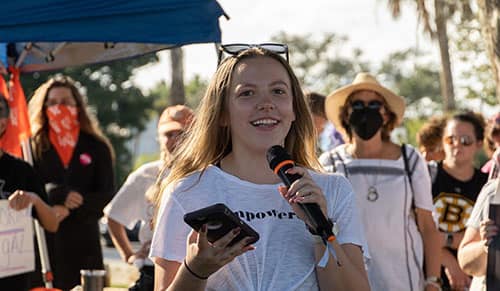By Julia Corrie
On Saturday, Oct. 2, over 200 people gathered at the Plaza de la Constitución for a “Bans Off Our Bodies” march. Organized by the Women’s March Alliance of North Florida, a variety of speakers were invited to tell their stories; I was one of them.
For most of my life, I knew how important bodily autonomy was, I was taught to respect other people’s space at a young age. I didn’t realize it until high school, but there were legislators in every state that was fighting hard to take that autonomy away from me.
On November 8, 2016, my life was changed. The presidential race was tight, and it was getting late, I made my mom promise to wake me up if Hillary Clinton won. I woke up the next morning with a heavy heart because that means that Donald Trump had assumed the single-most powerful position in the free world.
After that day, I decided to get more involved in politics and learn how the system affected me. I wanted to know what elections were happening, what policies were being signed into law, there was so much to learn and I wanted to know everything. A non-career politician was elected as the President of the United States, and I could not understand why.
5 years later, I am graduating from college and entering the real world as a functioning, educated adult. I have spent the last 4 years being an active member of Flagler College Democrats and working with multiple left-leaning organizations at the state and national level. Learning about the issues I’m passionate about, forming my own opinions, and the overall feeling of independence and individuality has been the most rewarding of my college experiences.
Fast forward to Oct. 2, when I am racking my brain to find something to say for this women’s march. Senate Bill 8 in the Texas legislature has been highly controversial, gaining international media attention. The President of the Florida Senate, Wilton Simpson, said that they are “already considering” including a similar bill at the start of the legislative session in January 2022.
Women’s reproductive rights are being threatened across the country, and now it is happening in my home state. This is a major issue because, no matter the person’s political or religious affiliation, a woman will not have the right to choose what happens to her body when she doesn’t want to carry out a pregnancy; it will instead be under the regulation of the law.
Many women will be harmed — even killed — because of this law. Abortions will happen regardless, as they always have. Many at-home practices are incredibly life-threatening, often the result of women feeling they have no other option but to terminate their pregnancies themselves. Not-so-surprisingly, women who perform at home terminations live in states and regions with incredible abortion restrictions and are forced to carry out their pregnancy unless they want to threaten their own lives.
I have lived in Florida for the majority of my life. I grew up here and I have since studied our state’s legislature carefully. In short, I am terrified of this bill being proposed. Florida in particular has a predominantly conservative legislative body. The likelihood of a bill like this passing is not completely far-fetched.
There must be action taken in order to stop this bill from reaching the Governor’s desk in the spring of 2022. Until then, I am going to do everything in my power to prevent it from moving to the house and senate floor. Emailing and calling my state representatives prior to the 2022 legislative session starting is going to be critical, as that is the only way they know which issues their constituents are passionate about.
Find your Florida State House Representative: https://www.myfloridahouse.gov/findyourrepresentative Find your Florida State Senator: https://www.flsenate.gov/senators/find



Be the first to comment on "Reproductive Rights: Florida’s Future"